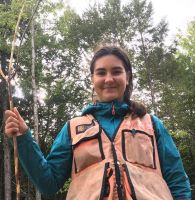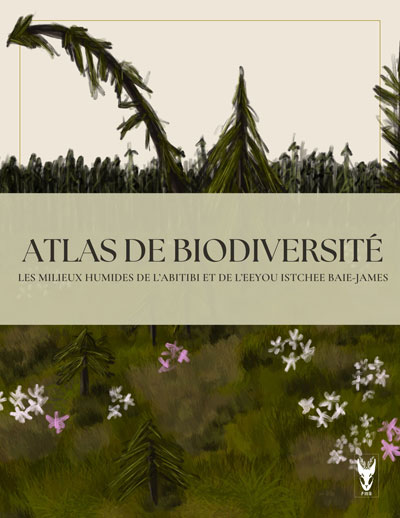
Liliana Perez
Chercheur régulier
Modélisation de systèmes complexes et écologie du paysage
Professeure-agrégée / Associate Professor
Responsable du programme D.E.S.S. en géomatique et cartographie dynamique
Faculté des arts et des sciences
Département de géographie
Université de Montréal
1375, Avenue Thérèse Lavoie-Roux
Bureau B-5009, Montréal QC H2V 0B3
Montréal, Québec, Canada
FORMATION
- Chercheur postdoctoral, UVic, (2011-2013)
- Ph.D en Géographie, SFU, (2011)
- M.Sc en Géographie, UPTC, (2003)
- B.Eng en Géodésie et Cadastre, UD, (2000)
THÈMES DE RECHERCHE
La complexité est inhérente aux processus écologiques et anthropogéniques. Mes intérêts de recherche consistent à en apprendre plus sur les relations et sur les interactions spatiales et temporelles façonnant les changements de notre monde. L'analyse spatiale, la modélisation et les systèmes d'information géographique (SIG) permettent d'étudier les problèmes complexes, tels que les changements climatiques, l'écologie du paysage et la foresterie, en représentant explicitement les phénomènes dans leur contexte géographique. Mes recherches focalisent sur la nature multidisciplinaire de la Science de l'Information Géographique (GISience) afin d'étudier les relations entre les processus écologiques et les patrons de distribution spatiale résultants.
Ayant comme fonction de capter la complexité et la non-linéarité des systèmes écologiques, les modèles informatisés se sont développés afin d'intégrer l'espace et le temps comme composantes centrales des processus écologiques. Le programme de recherche du LEDGE intègre de multiples approches informatiques de modélisation afin de simuler les effets des changements écologiques et environnementaux sur les comportements et sur les mouvements de la faune dans des écosystèmes fragiles.
Par exemple:
- Utilisation du Sol, Type de Couverture et Adaptation aux Changements Climatiques
- Réponses comportementales des oiseaux et des mammifères à la fragmentation de l'habitat, à la variabilité climatique et aux changements dans la forêt.
- Systèmes Intelligents d'Aide à la Décision Environnementale
- Perturbations Forestières et Propagation d'Espèces Invasives
- Dynamiques spatio-temporelles de la Tordeuse des bourgeons de l'épinette dans les forêts du Québec.
- La simulation et l'évaluation des perturbations forestières générées par les changements climatiques au Canada.
- Modélisation de la propagation des feux dans la forêt boréale au Canada.
Je suis aussi membre du Centre de la science de la biodiversité du Québec (CSBQ) ![]()
PUBLICATIONS
Livres
- Perez, L. (2001) Radarsat System: Methodological Proposal for the Implementation of the Radarsat System in the Curricular Program of Cadastre and Geodesy Engineering
Chapitres de livre
- Seuru, S., Perez, L., Burke, A. (2023) Why Were Rabbits Hunted in the Past? Insights from an Agent-Based Model of Human Diet Breadth in Iberia During the Last Glacial Maximum. In Modelling Human-Environment Interactions in and beyond Prehistoric Europe. (Seuru, S. and Albouy, B., Eds.) Cham, Springer International Publishing, pages 107-123
- Hébert, G.A., Perez, L., Harati, S. (2018) An Agent-Based Model to Identify Migration Pathways of Refugees: The Case of Syria. In Agent-Based Models and Complexity Science in the Age of Geospatial Big Data. Advances in Geographic Information Science. (Perez L., Kim EK., Sengupta R., Eds.) Springer, pages 45-5
Livres, numéros spéciaux et actes de colloques publiés à titre d'éditeur
- Perez, L., Kim, E.K.,, Sengupta, R. (2018) Agent-Based Models and Complexity Science in the Age of Geospatial Big Data. Series: Advances in Geographic Information Science Series. (Perez, L., Kim, E.K., and Sengupta, R., Eds.) Springer
Articles révisés par un comité de lecture
- Mahdizadeh Gharakhanlou, N., Perez, L., Henry, E. (2025) Evaluating environmental, weather, and management influences for sustainable beekeeping in California and Quebec: Enhancing beehive survival predictions. Journal of Environmental Management, 373:123783
- Vadnais, J., Perez, L., Coallier, N. (2025) Assessing foraging landscape quality in Quebec's commercial beekeeping through remote sensing, machine learning, and survival analysis. Journal of Environmental Management, 374
- Molowny-Horas, R., Harati-Asl, S., Perez, L. (2025) Understanding forest insect outbreak dynamics: a comparative analysis of machine learning techniques. Geo-spatial Information Science
- Mahdizadeh Gharakhanlou, N., Vadnais, J., Perez, L., Coallier, N. (2025) Urban buzz or urban bust? Beekeeping challenges, suitability, and survival insights in Montreal, Canada. Ecological Informatics, 90:103296
- Coallier, N., Perez, L., Franco, M.F., Cuellar, Y., Vadnais, J. (2025) Poor air quality raises mortality in honey bees, a concern for all pollinators. Communications Earth & Environment, 6(1):126
- Mahdizadeh Gharakhanlou, N., Perez, L., Coallier, N. (2024) Mapping Crop Types for Beekeepers Using Sentinel-2 Satellite Image Time Series: Five Essential Crops in the Pollination Services. Remote Sensing, 16(22)
- Harati-Asl, S., Perez, L., Molowny-Horas, R. (2024) Learning from conceptual models–a study of the emergence of cooperation towards resource protection in a social–ecological system. Geoscientific Model Development, 17(20):7423 – 7443
- Perez, L., Sengupta, R. (2024) Big Data (R)evolution in Geography: Complexity Modelling in the Last Two Decades. Geography Compass, 18(11)
- Perez, L., Cuellar, Y., Gibbons, J., Pinilla Matamala, E., Demers, S., Capella, J. (2024) Mapping the Future: Revealing Habitat Preferences and Patterns of the Endangered Chilean Dolphin in Seno Skyring, Patagonia. Biology, 13(7)
- Seuru, S., Burke, A., Perez, L. (2024) Evidence of an age and/or gender-based division of labor during the Last Glacial Maximum in Iberia through rabbit hunting. Journal of Archaeological Science: Reports, 56
- Chu, H., Wu, J., Perez, L., Huang, Y. (2024) Exploring Family Ties and Interpersonal Dynamics—A Geospatial Simulation Analyzing Their Influence on Evacuation Efficiency within Urban Communities. ISPRS International Journal of Geo-Information, 13(7)
- Mahdizadeh Gharakhanlou, N., Perez, L. (2024) From data to harvest: Leveraging ensemble machine learning for enhanced crop yield predictions across Canada amidst climate change. Science of the Total Environment, 951
- Mahdizadeh Gharakhanlou, N., Perez, L. (2023) Flood susceptible prediction through the use of geospatial variables and machine learning methods. Journal of Hydrology, 617
- Cuellar, Y., Perez, L. (2023) Multitemporal modeling and simulation of the complex dynamics in urban wetlands: the case of Bogota, Colombia. Scientific Reports, 13(1)
- Cuellar, Y., Perez, L. (2023) Assessing the accuracy of sensitivity analysis: an application for a cellular automata model of Bogota’s urban wetland changes. Geocarto International, 38(1)
- Mahdizadeh Gharakhanlou, N., Perez, L. (2022) Geocomputational Approach to Simulate and Understand the Spatial Dynamics of COVID-19 Spread in the City of Montreal, QC, Canada. ISPRS International Journal of Geo-Information, 11(12)
- Mahdizadeh Gharakhanlou, N., Perez, L. (2022) Spatial Prediction of Current and Future Flood Susceptibility: Examining the Implications of Changing Climates on Flood Susceptibility Using Machine Learning Models. Entropy, 24(11)
- Gauvin-Bourdon, P., King, J., Perez, L. (2021) Impacts of grazing on vegetation dynamics in a sediment transport complex model. Earth Surface Dynamics, 9(1):29-45
- Patel, J., Katan, J., Perez, L., Sengupta, R. (2021) Transferring decision boundaries onto a geographic space: Agent rules extracted from movement data using classification trees. Transactions in GIS, 25(3):1176-1192
- Harati, S., Perez, L., Molowny-Horas, R. (2021) Promoting the Emergence of Behavior Norms in a Principal–Agent Problem—An Agent-Based Modeling Approach Using Reinforcement Learning. Applied Sciences, 11(18)
- Anderson, T., Leung, A., Perez, L., Dragićević, S. (2021) Investigating the Effects of Panethnicity in Geospatial Models of Segregation. Applied Spatial Analysis and Policy, 14(2):273-295
- Anderson, T., Leung, A., Dragicevic, S., Perez, L. (2021) Modeling the geospatial dynamics of residential segregation in three Canadian cities: An agent-based approach. Transactions in GIS, 25(2):948-967
- Harati, S., Perez, L., Molowny-Horas, R., Pontius, R.G. (2021) Validating models of one-way land change: an example case of forest insect disturbance. Landscape Ecology, 36(10):2919-2935
- Katan, J., Perez, L. (2021) ABWiSE v1.0: Toward an agent-based approach to simulating wildfire spread. Natural Hazards and Earth System Sciences, 21(10):3141-3160
- Seuru, S., Burke, A., Perez, L. (2021) Rethinking the proportion of european rabbit (Oryctolagus cuniculus) in the diet of hunter-gatherers around the last glacial maximum in iberia; [Réflexions sur la proportion du lapin de garenne (Oryctolagus cuniculus) dans le régime alimentaire des chasseurs-cueilleurs autour du dernier maximum glaciaire en ibérie]; [Reflexiones sobre la proporción del conejo europeo (Oryctolagus cuniculus) en la dieta de los cazadores-recolectores en torno al último máximo glacial en iberia]. Trabajos de Prehistoria, 78(2):221 – 236
- Harati, S., Perez, L., Molowny-Horas, R. (2020) Integrating Neighborhood Effect and Supervised Machine Learning Techniques to Model and Simulate Forest Insect Outbreaks in British Columbia, Canada. Forests, 11(11)
- de Oliveira Tiné, M., Perez, L., Molowny-Horas, R. (2020) Modelagem das mudanças espaço-temporais de áreas úmidas: estudo de caso da Região Administrativa de Abitibi-Témiscamingue – Québec, Canadá. Revista Cartográfica (101):119-134
- Tine, M., Perez, L., Molowny-Horas, R. (2019) Hybrid spatiotemporal simulation of future changes in open wetlands: A study of the Abitibi-Témiscamingue region, Québec, Canada. International Journal of Applied Earth Observation and Geoinformation, 74:302-313
- Quesada-Ruiz, L.C., Perez, L., Rodriguez-Galiano, V. (2019) Spatiotemporal analysis of the housing bubble's contribution to the proliferation of illegal landfills – The case of Gran Canaria. Science of the Total Environment, 687:104-117
- Perez, L., Dragicevic, S., Gaudreau, J. (2019) A geospatial agent-based model of the spatial urban dynamics of immigrant population: A study of the island of Montreal, Canada. PLOS ONE, 14(7)
- Tiné, M., Perez, L., Molowny-Horas, R. (2019) Fundamentos teóricos de modelagem em Sistemas Complexos. Revista Contexto Geográfico, 4(7):111-120
- Gaudreau, J., Perez, L., Harati, S. (2018) Towards Modelling Future Trends of Quebec’s Boreal Birds’ Species Distribution under Climate Change. ISPRS International Journal of Geo-Information, 7(9)
- Gaudreau, J., Perez, L., Harati, S. (2018) Towards modelling future trends of Quebec’s boreal birds’ species distribution under climate change. Canadian Historical Review, 7(9)
- Gaudreau, J., Perez, L., Drapeau, P. (2016) BorealFireSim: A GIS-based cellular automata model of wildfires for the boreal forest of Quebec in a climate change paradigm. Ecological Informatics, 32:12-27
- Perez, L., Nelson, T., Coops, N.C., Fontana, F., Drever, C.R. (2016) Characterization of spatial relationships between three remotely sensed indirect indicators of biodiversity and climate: a 21years' data series review across the Canadian boreal forest. International Journal of Digital Earth
- Gaudreau, J., Perez, L., Legendre, P. (2015) Identification of variables explaining the spatial distribution of birds in the boreal forest and modeling of future trends: A multivariate approach [Identification des variables expliquant la distribution spatiale d'oiseaux de la forêt boréale et modélisation de tendances futures: Une approche multivariée]. CyberGeo, 2015:1181-1204
- Perez, L., Nelson, T.A., Bourbonnais, M., Ostry, A. (2015) Modelling the Potential Impact of Climate Change on Agricultural Production in the Province of British Columbia. Energy and Environment Research, 5(1):49-62
- Nelson, T.A., Coops, N.C., Wulder, M.A., Perez, L., Fitterer, J., Powers, R., Fontana, F. (2014) Predicting climate change impacts to the canadian boreal forest. Diversity, 6(1):133-157
- Perez, L., Dragicevic, S., White, R. (2013) Model testing and assessment: Perspectives from a swarm intelligence, agent-based model of forest insect infestations. Computers, Environment and Urban Systems, 39:121-135
- Perez, L., Dragicevic, S. (2012) Landscape-level simulation of forest insect disturbance: Coupling swarm intelligent agents with GIS-based cellular automata model. Ecological Modelling, 231:53-64
- Perez, L., Dragicevic, S. (2011) ForestSimMPB: A swarming intelligence and agent-based modeling approach for mountain pine beetle outbreaks. Ecological Informatics, 6(1):62-72
- Perez, L., Dragicevic, S. (2010) Modeling mountain pine beetle infestation with an agent-based approach at two spatial scales. Environmental Modelling and Software, 25(2):223-236
- Perez, L., Dragicevic, S. (2009) An agent-based approach for modeling dynamics of contagious disease spread. International Journal of Health Geographics, 8(1):50
- Perez, L., Rivera, J.A. (2002) Geography and Environment: Perspectives of Analysis. Revista Perspectiva Geográfica, 7:30-37
Articles publiés dans des actes de colloque (proceedings)
- Perez, L., Dragicevic, S. (2010) Exploring forest management practices using an agent-based model of forest insect infestations. In Modelling for Environment's Sake: Proceedings of the 5th Biennial Conference of the International Environmental Modelling and Software Society, iEMSs 2010. Spatial Analysis and Modeling Laboratory, Department of Geography, Simon Fraser University, 8888 University Drive, Burnaby, BC V5A 1S6, Canada, pages 766-773
Rapports scientifiques, manuels et autres
Aucun
Thèses, mémoires et essais
- Perez, L. (2011) Approaches for modeling spatial dynamics of forest insect disturbance: the integration of GIScience, complex systems theory and swarming intelligence. Thèse de doctorat, Simon Fraser University
Thèses, mémoires et essais supervisés
- Vadnais, J. (2024) Applications de l?intelligence artificielle géospatiale (GéoIA) pour analyser les effets du paysage sur la santé des ruches. Mémoire de maîtrise, Université de Montréal
- Seuru, S. (2023) Portée de l’exploitation du lapin (Oryctolagus cuniculus) par les humains au Dernier Maximum Glaciaire dans la Péninsule Ibérique : intégration de la Optimal Foraging Theory avec la Modélisation à Base d’Agents. Thèse de doctorat, Université de Montréal
- Cuellar Roncancio, C.R. (2023) Modélisation, simulation et analyse des dynamiques spatiales des zones humides urbaines par automate cellulaire : une étude de cas à la ville de Bogota, Colombie. Mémoire de maîtrise, Université de Montréal
- Demers, S. (2022) Modélisation spatiale du dauphin chilien (Cephalorhynchus eutropia) : le cas de Seno Skyring au Chili. Mémoire de maîtrise, Université de Montréal
- Katan, J. (2021) The prevalence of complexity in flammable ecosystems and the application of complex systems theory to the simulation of fire spread. Mémoire de maîtrise, Université de Montréal
- Harati, S. (2021) Towards simulating the emergence of environmentally responsible behavior among natural resource users : an integration of complex systems theory, machine learning and geographic information science. Thèse de doctorat, Université de Montréal
- Sauri Ramirez, J. (2020) Effet du changement climatique et de la phénologie de l’arbre hôte sur l’étendue spatiale des épidémies de la tordeuse des bourgeons de l’épinette : une approche à base d’agents. Mémoire de maîtrise, Université de Montréal
- Gauvin-Bourdon, P. (2020) Modélisation complexe des interactions entre la végétation et le déplacement des sédiments. Mémoire de maîtrise, Université de Montréal
- de Oliveira Tiné, M. (2018) Modélisation spatiale des changements dans les milieux humides ouverts par automate cellulaire : étude de cas sur la région administrative de l’Abitibi-Témiscamingue, au Québec, Canada. Mémoire de maîtrise, Université de Montréal
- Gaudreau, J. (2015) Modélisation de répartition d’espèces aviaires et de feux en forêt boréale du Québec dans un contexte de changement climatique. Mémoire de maîtrise, Université de Montréal
Articles non révisés par un comité de lecture
Aucun
<< Changhui Peng | MembresReguliers | Ilga Porth >>










